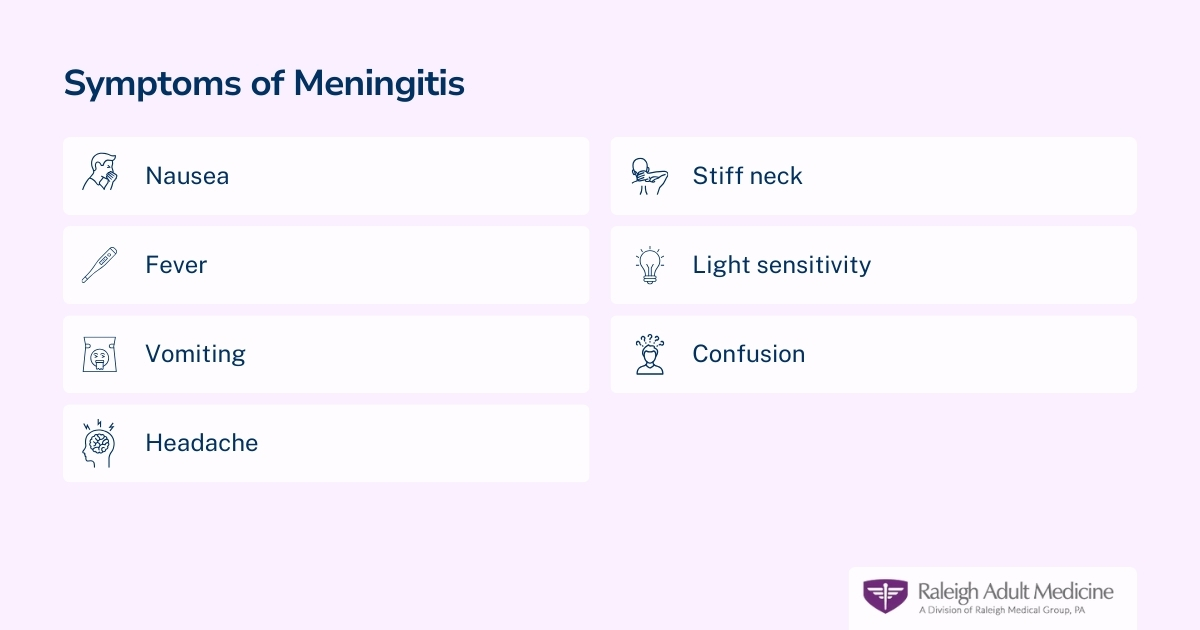How to Safely Manage Meningitis Vaccine Side Effects
If you’re preparing to get a meningitis vaccine, one of the first things you probably want to know about is meningitis vaccine side effects – what they are, how long they last, and how to manage them.
In this article, we’ll address those questions and discuss what meningitis is, who should get the vaccine, and answer other questions you may have about this important immunization.
At Raleigh Adult Medicine, we recognize that immunizations are an important part of preventative healthcare, and we offer vaccines for diseases including flu, pneumonia and shingles. Not sure which immunizations you need? We invite you to schedule an appointment so we can answer all your questions.
What is Meningitis & What Are The Symptoms?
Meningitis is a serious disease caused by inflammation of the membranes that cover the brain and spinal cord, known as meninges, and it is usually the result of a bacterial, viral, fungal or parasitic infection.
Symptoms of meningitis may include:

Who Should Get the Meningitis Vaccine?
The meningitis vaccine should be taken in early adulthood. The Centers for Disease Control recommends that adults who fall into the following categories are at higher risk and should get immunized:
- People living in close proximity to one another, such as college students or military trainees
- People living in an area where an outbreak has occurred
- People traveling to countries where meningitis is more common
- People with compromised immune systems, such as those with HIV, sickle cell disease, or those who have had their spleen removed
- Adults who are not current with the meningitis vaccine
The CDC also recommends the vaccination for all preteens and teens, as well as children aged 2 months through 10 years old at increased risk.
Children at higher risk include those who live in or travel to countries where the disease is more common, who have been exposed to an outbreak of the disease, and those with certain immune disorders.
The appropriate meningitis vaccine schedule for adults depends on the type of vaccine you receive and your relevant risk factors. Talk to your doctor to determine if the meningitis vaccine is right for you and when you should take it.
Are There Any Side Effects of the Meningitis Vaccine?
Most people who get the meningitis vaccine don’t experience any side effects or have only mild side effects. Depending on the type of vaccine you receive – MenACWY, MenB or MenABCWY – side effects may last between one and five days. Occasionally, serious reactions can occur.
Meningitis vaccine side effects may include:
- Redness, soreness, or swelling where you received the shot
- Muscle or joint pain
- Headache
- Fatigue
- Nausea or diarrhea
- Fever or chills
Allergic reactions to the vaccine are rare, but may include:
- Difficulty breathing
- Dizziness
- Fast heartbeat
- Hives
- Swelling of the face and throat
If any of these allergic reactions occur, you should call 911.
How to Manage Meningitis Vaccine Side Effects
To safely manage mild side effects from the meningitis vaccine, you can:
- Get plenty of rest.
- Drink lots of fluids to stay hydrated.
- Take medication like acetaminophen or ibuprofen to help with pain and fever.
- Apply a cold, damp cloth to alleviate discomfort at the injection site.
- Practice gentle stretching and arm movements to help lessen soreness and stiffness.
How Long Does the Meningitis Vaccine Last?
Immunity from the vaccine can last from one to two years and up to five years, depending on the type of vaccine you receive and your immune response. The MenACWY vaccine offers protection for up to five years, while the MenB vaccine is effective for one to two years.
Can You Still Get Meningitis After Receiving the Vaccine?
Meningitis vaccines are effective but cannot protect against all bacterial strains and variations, so some cases of meningitis may still occur. That’s why it’s important to be aware of the symptoms of meningitis even if you’ve been immunized.
Learn more about the meningitis vaccine and CDC recommendations.
Let Raleigh Adult Medicine Help Safeguard Your Health with the Right Immunizations
Keeping up to date with immunizations is an important part of managing your health. If you’re wondering which vaccines you need as an adult, when to get them, and how to minimize their potential side effects, we can help.
As internal medicine physicians in Raleigh, we take a comprehensive approach to your overall health. We’ll work with you to determine which vaccines are right for you and suggest an appropriate immunization schedule based on your specific health condition and circumstances.
Reach out to us today to schedule an appointment.
The content within this article and others on this website is only for educational purposes and should not be considered as medical advice. For any questions or concerns, please consult with your healthcare provider.
====
Sources:
- Centers for Disease Control, “Meningococcal Vaccines,”
https://www.cdc.gov/meningococcal/vaccines/index.html - KidsHealth.org, “Meningitis Vaccine,”
https://kidshealth.org/en/parents/meningitis-vaccine.html


